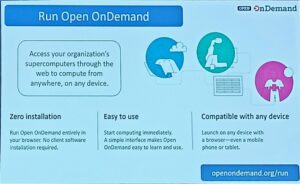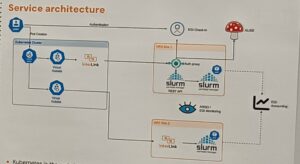ISC High performance
Conference visited by Thomas Eylenbosch
Introduction
From June 10th to June 13th, I attended the ISC (International Supercomputing Conference) in Hamburg. It was my first time attending the ISC conference, and I was truly impressed. I had never been to such a large conference before. In total, 3,585 participants from 54 countries attended the event 

Using the Swapcard app, I was able to highlight the talks I wanted to attend and connect with other participants. I discovered many new and interesting technologies shaping the HPC landscape.
With the rise of AI, the conference emphasized how HPC and AI can collaborate across various use cases. Another key highlight was the launch of Ultra Ethernet 1.0, a network stack designed to meet the demanding requirements of HPC and AI workloads.
I’d like to spotlight two talks/topics in this blog:
- Interlink from InterTwin
- Open OnDemand
Interlink from InterTwin
The Interlink technology from InterTwin caught my attention through a poster presentation. It serves as an abstraction layer between different computing methodologies—specifically HPC and Kubernetes.
For example, an user can launch an application like JupyterLab in a Kubernetes pod. The virtual kubelet delegates the execution of these pods to Interlink, which then automatically runs the workloads on either an HPC cluster or a Kubernetes cluster, depending on the requirements. Currently, only Slurm is supported as a scheduler. However, I spoke with a representative from EGI at the poster, and asked whether the plugin might support Altair Grid Engine in the future. While it’s not supported yet, it shouldn’t be too difficult to implement.
Open OnDemand
Another technology I’d like to highlight is Open OnDemand.
Open OnDemand is an open-source HPC portal that allows users to easily launch applications such as JupyterLab, RStudio, PyMOL, and Visual Studio Code on an HPC cluster. It also provides an easy way for system administrators and DevOps engineers to manage access to HPC resources through a web interface.

Importantly, Open OnDemand is not limited to scheduling applications and workloads on HPC clusters. It also supports launching and scheduling applications on a Kubernetes cluster. Since it’s open-source, the interface can be customized to your preferences. For example, if you want to launch a JupyterLab notebook via Open OnDemand, this can be integrated relatively quickly. Additionally, you can add your own plugins, modules, Python packages, … as needed.
The platform supports several authentication protocols, including: OIDC/OAuth 2.0, SAML, LDAP, Kerberos
Below is a slide showing some of the supported applications. but not all the applications are listed up.
Conclusion
There were many other talks I attended, but I won’t go into detail about all of them. Topics included energy efficiency versus time-to-solution, tape-based storage solutions, and more.
Overall, attending ISC in Hamburg was a fantastic opportunity. I enjoyed the talks and the exhibition. The exhibition hall was filled with vendors showcasing their latest and most innovative technologies.
With the rise of AI, GPUs are becoming increasingly important in server environments, and this trend was clearly reflected throughout the conference.



